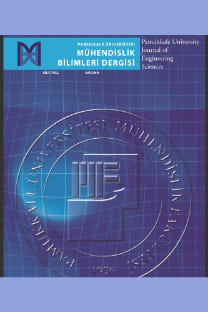Buck-Boost Çeviriciden Beslenen Seri DC Motorunun Bulanık Mantıkla Kalkınma Akımının Denetimi
DA motorlar genellikle elektrikli tren, vinçler, yük asansörleri gibi endüstriyel uygulamalarda tercih edilirler. yüksek kalkınma momentine sahip olduğundan dolayı başlangıçta yüksek akımla kalkınırlar. Bu yüksek kalkınma akımı motor sargılarına zarar verdiğinden ve güç tüketimini artırdığından dolayı mutlaka azaltılmalıdır. Bu işlem uygun bir sürücü ve denetleyici sistemiyle gerçekleştirilebilir. Bulanık mantık denetleyici uyarlanabilir özelliklere sahip olduğundan; belirsizliklere, değişken parametrelere ve yük dağılımına sahip sistemlerde güçlü sonuçlar üretebilmektedir. Bu çalışmada Alçaltıcı- Yükseltici Çeviriciden (Buck-Boost Converter) beslenen seri bağlı bir DA motorun bulanık mantık hız denetimi bilgisayar simülasyonu yoluyla incelenmiştir. Bulanık mantık denetimin üstünlüğünü görmek amacıyla aynı motora aynı durumlar altında klasik PI denetimi uygulanmış ve bir karşılaştırma yapılmıştır. Simülasyon için C++ Builder yazılımı kullanılmıştır. Simülasyon sonuçlarına göre bulanık mantık denetimin klasik PI denetime göre daha güçlü cevap verdiği ve motorun kalkınma anında daha düşük akım çektiği gözlenmiştir.
Anahtar Kelimeler:
Bulanık mantık denetleyici, PI denetleyici, Seri da motor, Buck-boost çevirici, Akım denetimi.
Start Up Current Control of Buck-Boost Convertor-Fed Serial DC Motor
Generally, DC motors are given preference for industrial applications such as electric locomotives, cranes, goods lifts. Because of they have high starting moment; they initially start with high current. This high start-up current must be decreased since it may damage windings of the motor and increases power consumption. It could be controlled by an appropriate driver system and controller. The nature of fuzzy logic control has adaptive characteristics that can achieve robust response to a system with uncertainty, parameter variation, and load disturbance. In this paper, fuzzy logic based control of start-up current of a Buck-Boost Converter fed serial DC motor is examined through computer simulation. In order to see the advantages of fuzzy logic control, classical PI control has applied to the same motor, under same circumstances and has been compared. C++ Builder software has been used for the simulation. According to the simulation results, plainly, fuzzy logic control has stronger responses than classical PI control and uses lower current at starting moment.
Keywords:
Fuzzy logic controller, PI controller, Serial DC motor, Buck-boost converter, Current control.,
___
- Akcayol, M.A., Cetin, A., Elmas, C. 2002. “An educa- tional tool for fuzzy logic-controlled BDCM” Education, IEEE Transactions on. 45 (1), 33-42.
- Aydemir, S., Sezen, S., Ertunc, H.M. 2004. “Fuzzy logic speed control of a DC motor”, Power Electronics and Motion Control Conference. (2), 766-771.
- Elmas, C. 2003. “Bulanık mantık denetleyiciler”, Seckin publishing, Ankara.
- Guillemin, P. 1996. “Fuzzy logic applied to motor control”, Industry Application. 32 (1), 51-56.
- Khoei, A., Hadidi, Kh., Yuvarajan, S. 1998. “Fuzzy-logic DC-motor controller with improved perfor- mance”, Industry Applications Conference. (3), 1652-1656.
- Krishnan, R. 2001. “Electric motor drives”, Prentice Hall, USA.
- Linares-Flores, J., Sira-Ramirez, H. 2004. “DC motor velocity control through a DC-to-DC power converter”, Decision and Control 43rd IEEE Con- ference on. (5), 5297-5302.
- Mohan, N., Undeland, T.M., Robbins, W.P. 1989. “Power Electronics: Converters, Applications and De- sign”, John Wiley & Sons, Singapore.
- Navas-Gonzalez, R. 2000. Vidal-Verdu, F.; Rodriguez- Vazquez, A.; “A mixed-signal fuzzy controller and its application to soft start of DC motors”, Fuzzy Systems Conference. (1), 128-133.
- Paul-l-Hai Lin, Sentai Hwang, Chou, J. 1994. “Com- parison on fuzzy logic and PID controls for a DC motor position controller”, Industry Applica- tions Society Annual Meeting. 1930-1935.
- Tan, H.L., Rahim, N.A., Hew, W.P. 2001. “A simplified fuzzy logic controller for DC series motor with improve performance”, Fuzzy Systems Confer- ence. (3), 1523-1526.
- ISSN: 1300-7009
- Başlangıç: 1995
- Yayıncı: PAMUKKALE ÜNİVERSİTESİ
Sayıdaki Diğer Makaleler
Mehmet AKSARAYLI, Serkan ALTUNTAŞ
Plastik Enjeksiyon Kalıpları İçin Bilgisayar Destekli Soğutma Sistemi Tasarımı
Hakan GÜRÜN, Ahmet ÖZDEMİR, Tunahan ACAR
Batı Akdeniz Havzalarının L-Momentlere Dayalı Bölgesel Taşkın Frekans Analizi
Şev Stabilitesi Kazıklarına Etkiyen Yatay Yüklerin Belirlenmesi
Mehmet Rıfat KAHYAOĞLU, Gökhan İMANÇLI, Gürkan ÖZDEN
Öğrenme Etkili Erken/Geç Tamamlanma Çizelgeleme Problemleri İçin bir Literatür Araştırması
Mesut Cemil İŞLER, Bilal TOKLU, Vel ÇELİK
Pasinler (Erzurum) Kuzeyindeki Volkanik Kayaçların Mineral Kimyası ve Jeokimyası
Oktay KILIÇ, Hüseyin KURT, Kürşad ASAN, Gürsel KANSUN
Uçakların Yanlamasına Hareketlerinin Gözleyiciler ve Kalman Filtresi ile Durum Kestirimi
